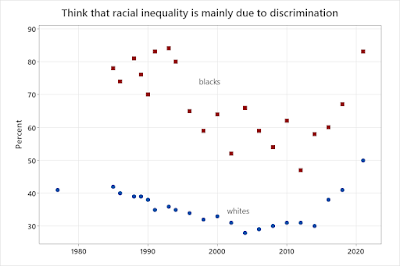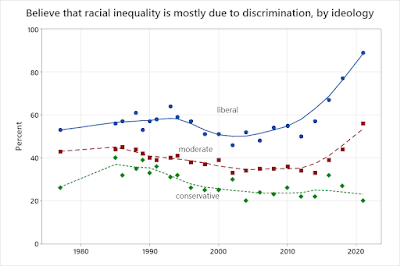The values poll continues to get attention--since my last post, I've seen three New York Times columns discussing it (Ross Douthat, Peter Coy, David Brooks). In the Dispatch, Nick Catoggio calls it >the hottest topic in political commentary." My last post discussed specific issues with that survey--this one will address the general question of changes in values.
1. What has happened: In the 21st century, there's clearly been a turn away from religion in the United States, although you can argue about whether it's a new thing or the continuation of a longer trend. For example, the Gallup Poll has a question on whether "religion can answer most or all of today's problems," which was asked in 1957, 1974, and pretty regularly starting in the 1980s. The results through 2017:
It was asked again in 2018 and agreement fell below 50% for the first time. There's also been a decline, or at least a moderation, of patriotism. I wrote about questions comparing the United States with others in this post. One of those questions was asked in the recent WSJ poll: 21% said it "stands above all countries in the world," 50% that is is "one of the greatest countries in the world, along with some others, and 27% said "there are other countries better than the United States." When that was first asked in 2011, the numbers were 38%-53%-8%; in 2018 they were 24%-55%-21%. Finally, there's also been a decline in the belief that people need to have children in order to have a full life. I don't think I've posted on that, but it's pretty clear.
2. What hasn't happened: a dramatic change in values since 2019. This was one thing that brought attention to the survey, and made it especially appealing to the right. From their point of view, most of the big developments since 2019 have been bad--the response to Covid, the rise in "wokeness," most of the policies of the Biden administration. So evidence of a general collapse in values fit with their sense that things had gone badly wrong in the last few years. But rapid changes in opinions are rare, and some of the apparent changes in the WSJ polls just aren't credible (e. g., a fall from 80% to 58% rating "tolerance for others" as very important). So they are probably the result of the change in survey procedures. Although social desirability bias may be a factor, I don't think it's a big factor with these opinions, especially when it comes to the difference between "very important" and "somewhat important." But in addition to the issue about response order I mentioned last time, I think the chance that people will be careless or not take the survey seriously is greater in online surveys. The documentation to the survey mentions that they removed about 5% of the surveys because of high rates of non-response, completing the survey too fast, or "straight-lining all grid questions." But it seems likely that attention and effort are matters of degree, so that if 5% were clearly not paying attention, some larger number were not paying much attention. It's hard to say exactly what affect this would have--it just means that we can't be sure about how much of the apparent change is real.
3. What's uncertain: how much people value obligations to their family versus their own interests, or money versus other goals. I think that there's a long term trend towards emphasizing non-material goals (like wanting a job that's fulfilling or does good for the world), but I'm not really confident of that. The focus on money also goes up and down depending on short-term economic conditions, making it harder to distinguish any trend. People clearly feel less obligation to get married and have children, but beyond that--for example, whether parents are more or less willing to sacrifice for the benefit of their children--it's hard to say. I will look for other questions and write about them in a future post.










